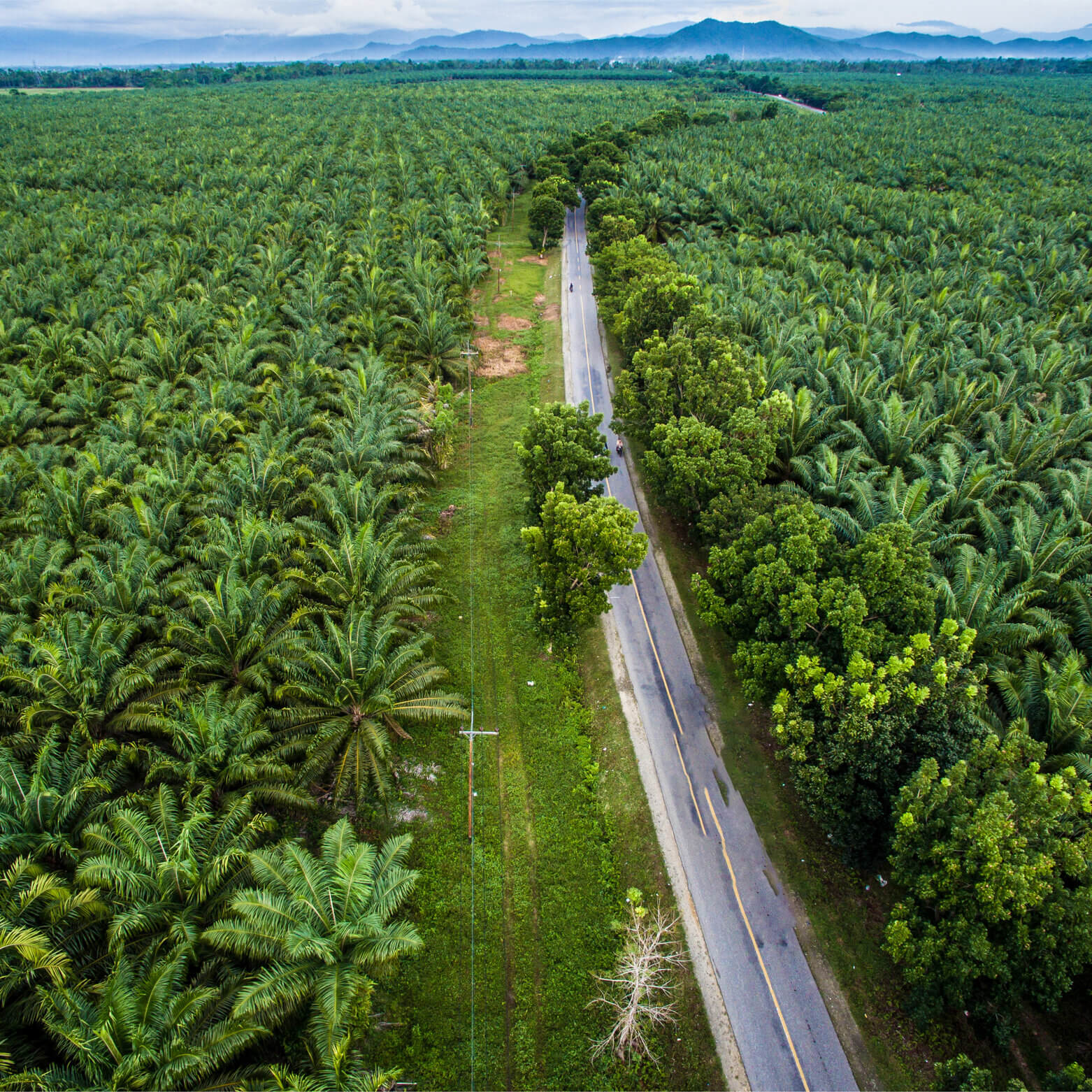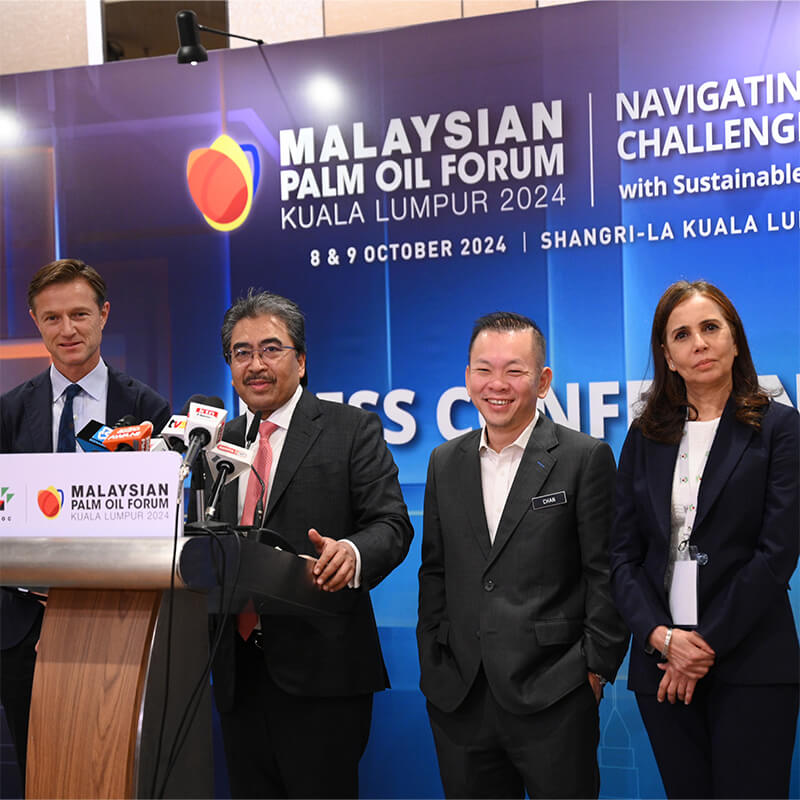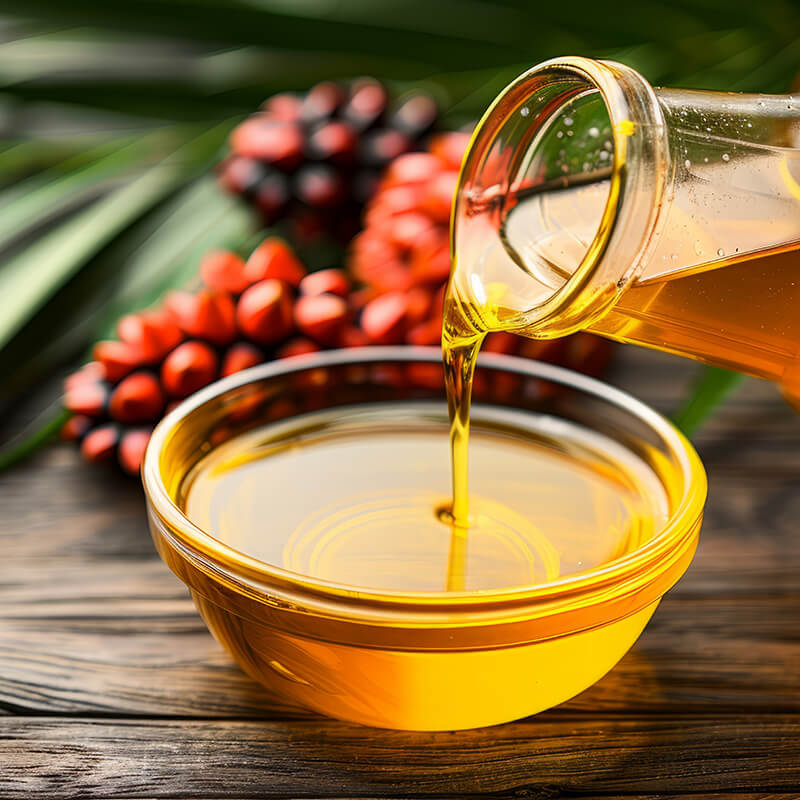Malaysian Sustainable Farmer Chronicles: The Millennial Oil Palm Farmer
Meet the next-gen oil palm farmer who steers his farming comrades to embrace sustainable farming, leverage new tools and reconnect with the land.
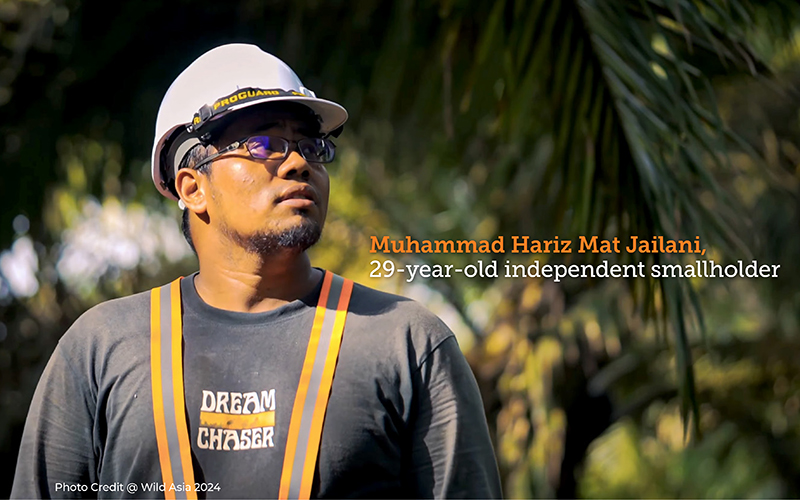
How are millennial farmers different from their older compatriots?
Historically, farming has always been driven by sustenance—to feed, shelter, and clothe the family. Today, new-generation farming prioritises lifestyle choices, advocacy, and conservation.
“My father’s generation extols the virtue of hard work. They don’t mind the struggle if they can create a better life. They don’t mull over green issues,” says 29-year-old independent smallholder Muhammad Hariz Mat Jailani.
“My generation puts equal weight on social, environmental and economic success. Working smart outweighs working hard!”
The millennial generation (born between 1981 and 1996) bridges traditional growing methods with innovative practices, leverages technology and tools to farm more efficiently, and cares about environmental challenges.
The Gen Y Farmer
Muhammad Hariz is a third-generation oil palm farmer from Kampung Sungai Lesong, an idyllic Malay village in Batang Padang District, Perak, a two-hour drive north of Kuala Lumpur. He owns and manages a 1.2 ha smallholding in Sungai Lesong.
According to a study, young farmers like Muhammad Hariz are an anomaly in Malaysia, where the average oil palm farmer is 58 years old (Azman Ismail, 2018). 92% of these smallholders hire workers to harvest and collect FFB (fresh fruit bunches), and over 65% are foreign workers. As a full-time farmer, Muhammad Hariz is as hands-on as they come. He does everything from applying fertiliser and grass cutting (to manage weeds) to harvesting and collecting palm fruits. He also helps at his father’s oil palm plots, totalling 40 hectares, for additional income.
“One of the many perks of being young and strong means we’re not overly-dependent on migrant labour,” says Muhammad Hariz with a smile. “More importantly, we bring a fresh mindset and are open to trying and exploring different approaches.”
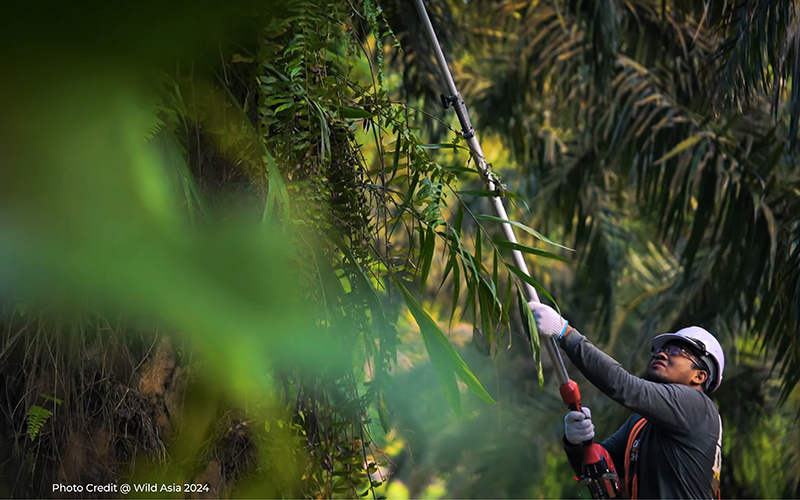
The new-gen farmer hopes more young people will be interested in venturing into the sustainable oil palm industry.
As the chairman of the Young Farmers Coalition under the Farmers’ Organisation Authority (Pertubuhan Peladang Kawasan Tapah or FOA) in Tapah Area, Muhammad Hariz leads a group of 90 farmers under the age of 40 from diverse backgrounds—from oil palm smallholders and vegetable growers to cash crop, livestock, and aqua farmers.
This Gen Y farmer is on a mission to grow the new-generation farmer network that advocates for nature-positive farming.
The Formative Years
Muhammad Hariz’s farming journey is a complex trajectory. Born into a family of six siblings, the middle child was adamant about not following in his father and grandfather’s footsteps.
In Sungai Lesong, agriculture — oil palm and other cash crops — is the mainstay of the local economy. Muhammad Hariz’s grandfather began planting oil palm in 1987 on land converted from rubber plantations.
His father, Mat Jailani Arshad, inherited the family legacy in the 1990s.
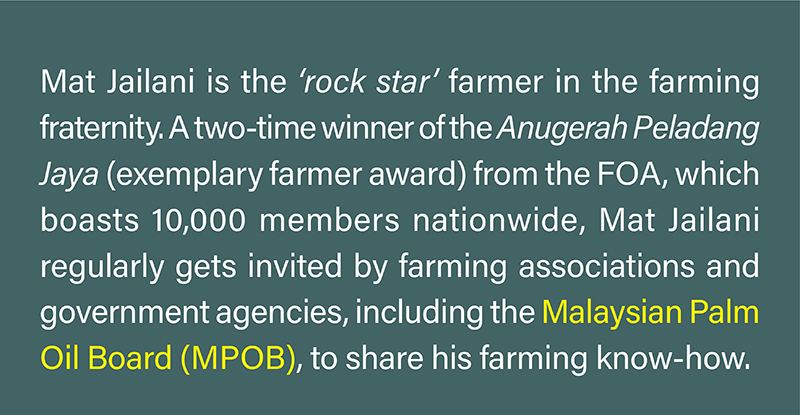
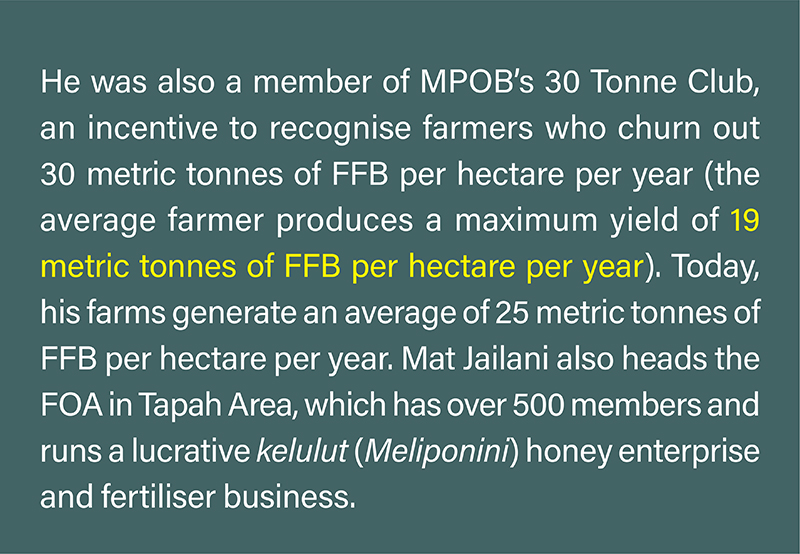
Talk about the pressure of being his father’s son.
After secondary school, Muhammad Hariz was not keen to continue higher education. He joined the rural exodus to seek greener pastures.
“Like my peers, I wanted an office job. Farming was perceived as dirty, back-breaking and backward,” he admits. With only a high school diploma, his options were limited, and he could not find stable employment. After shuffling between odd jobs, he changed tack.
“My dad wasn't getting any younger, so I thought it was time for me to step up,” says Muhammad Hariz. His older siblings pursued their tertiary degrees, and the two younger siblings were still in school.
In 2015, his father gave him a three-acre plot to develop. Unlike most farmers starting, Muhammad Hariz had the upper hand, thanks to lessons gained from working on the family farm.


“One of many valuable tips from my dad was the importance of sourcing high-quality palm seedlings from a trusted supplier,” says Muhammad Hariz. He waited one year to get his hands on good seedlings. In the interim, he planted bananas and pineapples as cash crops. Taking a cue from his dad, Muhammad Hariz reared livestock like cows, buffalos and goats as his side hustle.
In 2019, he joined MPOB’s Sustainable Palm Oil Clusters (SPOC) initiative to work towards his MSPO certification. Although he usually taps into his father’s broad experience and wisdom, he is always open to gaining new insights.
“Through the TUNAS extension agents, I learned about good agricultural practices like cutting down chemical inputs and the importance of nutrient management and keeping ground cover to maintain moisture and soil organic matter,” he explains. He received his Malaysian Sustainable Palm Oil (MSPO) certification in 2020. “I shaved 30% off my production costs by reducing chemical use.”
However, as a young, impressionable farmer, Muhammad Hariz is not immune to other farmers’ critiques. When he switched to using a grass cutter instead of herbicide to manage weeds, neighbouring farmers complained about the messy undergrowth.
“They said, ‘You have to use racun (pesticide) for oil palm!’ Of course, that sowed a seed of doubt, and I wondered if I was doing the right thing,” he says. Yet his father’s farms have been chemical-free for eight years and still reaping high yields.
“He must be doing something right,” Muhammad Hariz adds. “Another piece of advice from dad: “Don’t listen to those who discourage you!” It has been four years since he last applied herbicide on his farm.

Connecting the Dots
The WAGS BIO training proved to be a game-changer for Muhammad Hariz.
Regenerative farming helps restore and regenerate soil health by restoring its carbon content and improving plant health, productivity, and resistance to pests and diseases. Through hands-on BIO workshops, Muhammad Hariz learned to make compost, fruit enzymes, and fish fertiliser to create microbe-rich soil. He also uncovered the benefits of intercropping and integrated pest management to improve soil and farm biodiversity.
He has used BIO juice and fish hydrolysate (liquid enzyme fertilisers) on his farm for three years and progressively reduced synthetic fertiliser applications.
Today, his yields have grown by 30%, his trees are disease- and pest-free with healthy green fronds, and more insects are buzzing around his farm, indicating a healthy ecosystem.
“We spotted a giant shield bug (Pycanum sp.) recently. My dad says this bug has not been seen in this village for 50 years,” says Muhammad Hariz proudly.
Psyched by the tangible results, he ran an informal BIO juice workshop for farming friends in 2023. Four of the 10 farmers who showed up for the workshop still apply what they learned to their farming operations. One 32-year-old farmer commercially grew bananas, pineapples, and sengkuang (Pachyrhizus erosus) and made a 180-degree switch to organic fertiliser. Not only did he reduce his farming costs, but he was fetching a premium price for his chemical-free crops.
“Beyond yields and profits, what excites us is knowing that we have affordable, low-tech solutions to build resilience to climate change,” says Muhammad Hariz. For these young farmers, adopting regenerative farming translates to advocacy in action.
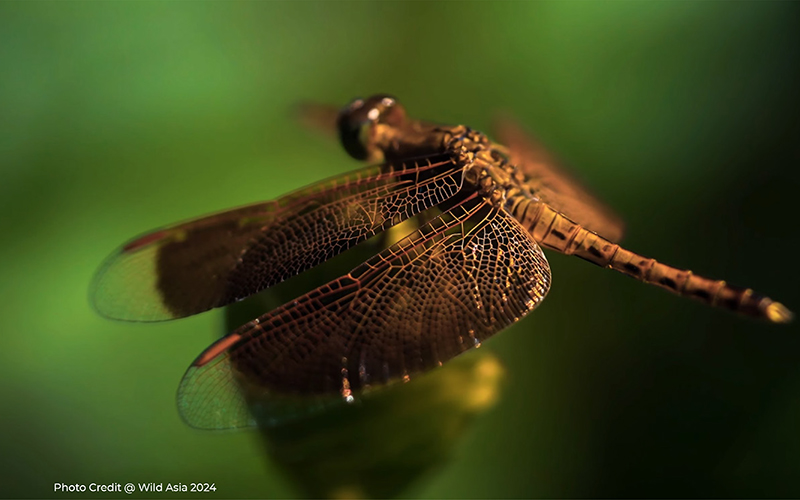
Muhammad Hariz puts his BIO training into practice, resulting in a luscious green farm and pest-free trees, inviting many insects that don’t appear often.

Leading the New Generation of Farmers
Today, Muhammad Hariz’s income averages RM4,000 a month, including wages from working on his dad’s farms. He invested in a powerful mist blower to spread liquid fertiliser and an electric harvester to increase his work efficiency.
“Sometimes I wonder when I will be as good as my dad,” he says, chuckling. “But he’s happy if I emulate just 50% of his practices.” More importantly, he knows his father always has his back.
To his peers, however, Muhammad Hariz is their role model and ring leader. Heading the young farmers’ group allows him to share ideas and practices with other farmers. Of the 90 members, 40 are oil palm farmers, including part-timers. The group meets monthly to brainstorm ideas and organise talks, workshops, and study tours to farms and factories. Topping their agenda are land, subsidy and market access, high equipment costs, and training opportunities to hone a range of skill isets.
“We’re rallying for more support and incentives for young farmers,” says Muhammad Hariz. “There is still so much to learn, like harnessing technology to improve farming, for example.”
Though many young people are keen to take up farming full-time, they are wary about the economic viability and uncertainties.
“Farming is a way to be economically empowered so young people won’t be exploited,” says the bachelor who enjoys hobbies like badminton, football and mountain biking. He is also recruiting members to form a youth club that champions sustainable farming.

So far, he has 15 sign-ups, including a police officer and a doctor, but he needs a minimum of 25 members to register the club. As if he does not have enough on his plate, Muhammad Hariz is starting an aqua farming venture. “Diversifying my income is another way to be resilient to swings in oil palm prices,” he explains.
But come February 2025, he is headed for another big adventure. He has been accepted into a part-time degree programme in business management at Universiti Malaysia Pahang (UMS). The onsite classes will only be held on weekends. Therefore, he can continue managing his farm.
“It’s time to step up my business knowledge and work towards my dream to become a farmer-entrepreneur,” he says.
Slowly but surely, he is stepping out of his father’s shadow.
In Malaysia, 5.65 million hectares of land have been cultivated with oil palm (MPOB 2023). Independent smallholder farms like Muhammad Hariz Mat Jailani (40.46ha of land or less) account for 14.5% (0.82Mha) of this planted area. As of 2023, there are 214,680 independent smallholders in Malaysia.

Article copyright @ Wild Asia 2024












